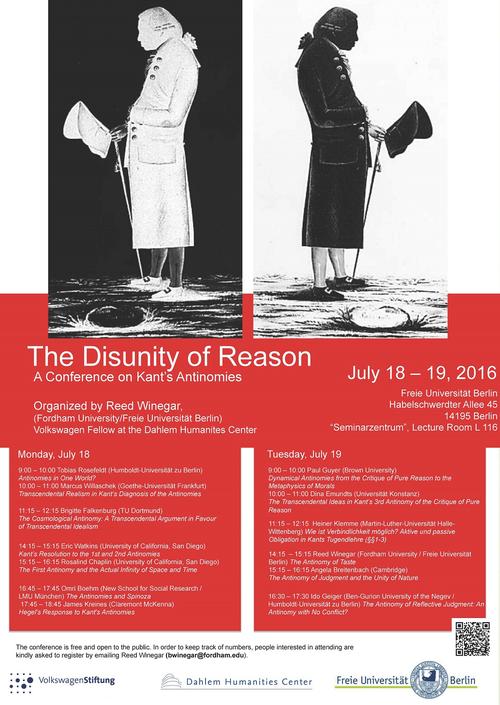Organizer: Reed Winegar (Volkswagen Fellow at the Dahlem Humanities Center)
In the Kritik der reinen Vernunft, Kant claims that human thought naturally leads to
an antinomy of pure reason – that is, a conflict between the laws of reason itself.
According to Kant, this antinomy “works the most strongly of all to awaken
philosophy from its dogmatic slumber, and to prompt it toward the difficult
business of the critique of reason itself.” Indeed, in a famous letter to the
philosopher Christian Garve, Kant claims that his discovery of the antinomy of pure
reason led to his development of the entire Critical Philosophy. The central role of
antinomies in Kant’s Critical Philosophy is further signaled by the inclusion and
discussion of antinomies in nearly all of Kant’s major works, including the Kritik der
praktischen Vernunft, Kritik der Urteilskraft, Die Religion innerhalb der Grenzen der
bloßen Vernunft, Zum ewigen Frieden, and Die Metaphysik der Sitten. The importance
of Kant’s antinomy theory was immediately recognized by thinkers such as Fichte,
Hegel, Hölderlin, Maimon, Maaß, and Schelling, and Kant’s antinomy theory has
subsequently exerted a powerful influence on metaphysical, epistemological,
scientific, religious, moral, political, historical, and aesthetic theories. This workshop
proposes to examine both the historical and systematic importance of Kant’s
antinomies; participants are encouraged to consider Kant’s concept of an antinomy
in relation both to Kant’s own intellectual context and to our current intellectual
situation today.
The program is available here.
In cooperation with
Zeit & Ort
18.07.2016 - 19.07.2016
Freie Universität Berlin, L116 (Seminarzentrum), Habelschwerdter Allee 45, 14195 Berlin


